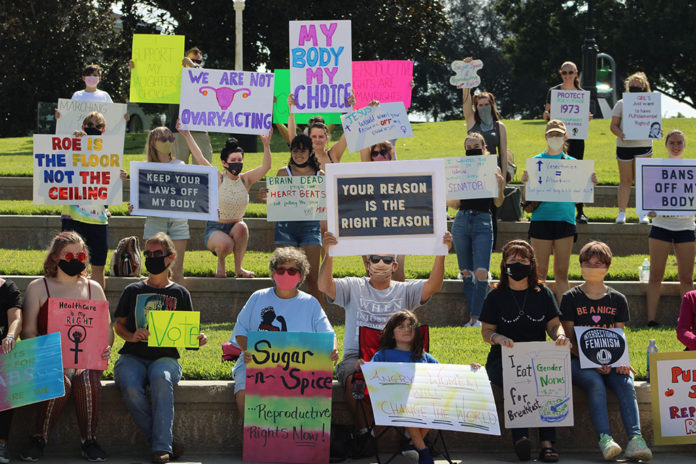
Salvatore Ambrosino
During a day of nationwide protest on Oct 2., two women’s rights activists joined mothers, business owners and some Florida Southern students to march on downtown Lakeland in response to legislation proposed in the Florida House of Representatives.
The Florida Heartbeat Act, sponsored by State Rep. Webster Barnaby in September, follows suit of Texas’ recent ban on abortion after a fetal heartbeat is detected. Filed 22 days after the Texas ban was enacted on Sept. 1, the Florida bill would implement what women’s rights activists say to be the most restrictive abortion laws in the country.
The two activists who organized the protest, Kim Lovering and Bonnie Patterson-James, say that they were surprised when they learned no marches were going to occur in Polk County on a day of over 650 Women’s March events occurring simultaneously across the country.
“I couldn’t believe it, I was outraged,” said Patterson-James, a grandmother and former healthcare worker. “There had to be a voice. So I signed up, I put a post out there that we hadn’t even gotten approval, but the voice had to be out there.”
Patterson-James reached out to her sister and began organizing the march with her other friend turned co-organizer Lovering.
“I was marching with or without an approval and said with 3 or 30 we are marching,” Patterson-James said. “As loud as we can.”
By the evening of Sept. 28, the day the event was registered, only 10 had signed up to march. By Saturday Oct. 2, Patterson-James said there were 45. Along the way, the movement gained supporters from the sidewalks they marched, building into a larger crowd that would march on the promenade of Lake Mirror.
“We picked up women and men and allies along the route, and more in the promenade,” Patterson-James said.
Patterson-James and Lovering also succeeded in engaging college students in the march, with a number of the protestors from Florida Southern College.
“There’s a lot of women at Florida Southern whose rights are now under attack,” junior Ariana Perera said, angry at the state’s scientific misguidance and infringement of church and state. “A lot of people wouldn’t even know they’re pregnant by the time a heartbeat forms.”
The bill proposed would cut the time women have to receive abortions from 22 weeks of pregnancy to 6. The amount of time pregnancy awareness takes on average is 5.5 weeks, maybe a couple days short of the proposed cut off, a marker at the center of debate, that scientists and activists have disagreed with persistently as being the starting point for what is considered a living human being.
“It would ruin lives, it would devastate lives,” said Patterson-James.
Students involved with the protest say it’s rare to have the opportunity to participate in such marches, but it’s important to do so.
“I’m glad that people are here, seeing other Florida Southern College students here, that there was a really good turnout,” freshman Arlette Martinez said. “I know it’s really rare in somewhere like Polk County. I think doing this is important, because I wouldn’t want to see something like [Texas’] restrictive abortion laws happening here in Florida.”
Patterson-James and Lovering, who feared that legislation from Texas would eventually bleed into Florida, say they have more planned and will continue to be voices for women’s rights and reproductive issues.
“This is going back to the dark ages,” organizer Lovering said. “This legislation is going to send women places they shouldn’t go to get abortions.”
Patterson-James says she is taking time to educate herself before returning to organized protest so she can more specifically demand change. “I wish I had your guts when I was your age,” Patterson-James said. “I wish I was just as informed at your age.”
“This is a dire situation,” Patterson-James said. “I’ve only just begun—I am looking at what Polk County is missing.”
Editor’s Note: Mylena Ferman conducted student interviews.







